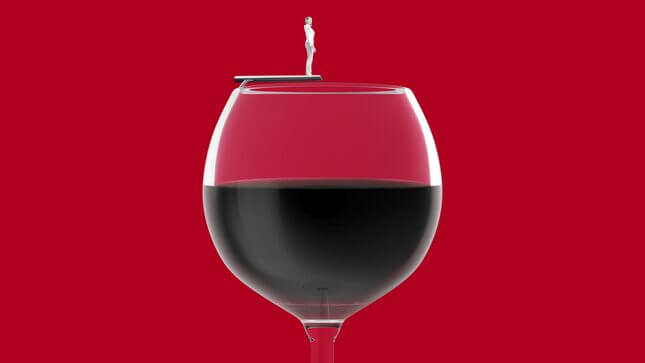The Wine Mom's Quiet, Cheerful Facade of Rebellion
Latest
Graphic: Elena Scotti (Photos: Getty Images, PixelSquid)
In late March of last year, amid stay-at-home orders and school shutdowns, a Facebook group identifying itself as “a place for Hot Mess Mamas” posted a photo of four glasses of red wine at various levels of fullness. Slapped onto the image was bold text reading, “Today’s Homeschool Lesson ‘Fractions.’” There was a number under each glass: 1/4, 1/2, 3/4, 1. “Any ideas for algebra?” asked the caption, tacking on a host of hashtags: #wine, #winemom, #momwines, #momdrinks, #badmom, and #funnymom.
In the coming weeks, as parents adapted en masse to home or virtual schooling, the page featured more joke lesson plans, several involving wine corks used to demonstrate everything from addition to “BUOYANCY & wine displacement.” In the latter case, three corks were bound together in a makeshift raft and floated in a glass of red wine. The image again featured the notable hashtag: #winemom.
That first Facebook post featuring wine glasses was recently highlighted in a paper published in the journal Sociology Compass examining the rise of the “wine mom” discourse, which manifests in everything from “Mommy juice” wine tumblers to memes reading “THE MOST EXPENSIVE PART OF HAVING KIDS IS ALL THE WINE YOU HAVE TO DRINK.” It’s a wry, humorous phenomenon embraced by mostly white, middle- to upper-class women who “self‐deprecatingly” bond “over the stressors of parenting,” it “touts alcohol use as necessary means for coping and escapism,” explain academics Harmony Newman and Kyle Anne Nelson in their journal article.
They argue that this “constitutes a false resistance, masking conformity to society’s unattainable standards of mothering and unequal systems that oppress women and inhibit well‐being.” All that irreverent endurance traps moms in a punishing paradigm: they rebel just enough to get through the day without ever escaping the impossible maternal ideal.
It’s not just the wine mom discourse that does this. Just as that meme first gained traction around 2015, so did similar motherhood takes. The Facebook group Unicorn Moms launched with the declaration that perfect moms, like unicorns, “don’t exist.” Then in 2016 came the wildly popular #IMomSoHard YouTube series, which, as I wrote previously, provides comedic rants on “kid germs, clueless husbands who put clean diapers on top of dirty diapers, and the tyranny of Pinterest cake pops,” alongside a cheeky celebration of wine, or “happy juice.”
Moms are allowed these small, Instagram-friendly dissents, none of which offer an actual challenge to the systemic nature of mothers’ exhaustion and overwhelm
That same year saw the release of the Hollywood film Bad Moms, which depicts a group of women who, falling short of a PTA ideal, raucously reject maternal mandates in a booze-filled night of revelry.
We live in an age of “sassy mom merch,” as Jia Tolentino put it, that doesn’t just celebrate “coffee, wine, and Amazon Prime,” but also dryly announces via t-shirt: “Thou Shall Not Try Me: Mood 24:7.” Moms are allowed these small, Instagram-friendly dissents, none of which offer an actual challenge to the systemic nature of mothers’ exhaustion and overwhelm. “All [of these things] are connected in that they’re responses to this oppressive set of expectations in terms of what mothers should be,” says Newman.
Those expectations are what is known as “intensive parenting,” a style of childrearing that emerged against the backdrop of growing economic inequality and a lack of social supports, and which sees parents fiercely dedicated to ensuring their children’s future success and stability. Moms are uniquely implicated in the demands of the intensive approach: As Newman and Nelson write, moms “must be physically and mentally healthy, hold a positive attitude, and maintain high energy levels while constantly providing children with safe and well‐resourced homes, nutritious meals and nurturing activities, educational stimulation, and endless devotion.”
-

-

-

-

-

-

-

-

-

-

-

-

-

-

-

-

-

-

-

-

-

-

-

-

-

-

-

-

-

-

-

-

-

-

-

-

-

-

-

-








































